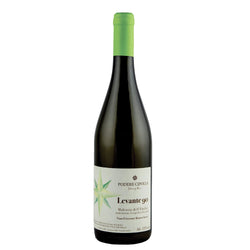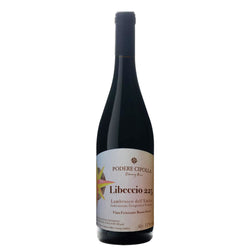Denny Bini è considerato uno dei nomi più scintillanti nel mondo dei Lambruschi artigianali. La cantina, Podere Cipolla, sorge alle porte della città di Reggio Emilia, più precisamente nella piccola frazione di Coviolo, dove le pianure si trasformano dolcemente in verdi colline. L’avventura di Denny iniziò nel 2003 quando decise di prendere in affitto pochi ettari dal nonno e piantare le sue vigne. Il giovane adibì queste terre con le uve locali, principalmente Lambrusco, per poi vinificarle nel garage di casa. Poco tempo più tardi un amico gli concesse di utilizzare la sua cantina, sancendo così l’inizio ufficiale della storia della cantina. Un approccio artigianale legato alle antiche tradizioni contadine è ancora oggi il credo che ha visto il ragazzo crescere e diventare un uomo. Una storia di amore, quella tra Denny e la sua terra d’origine, che si concretizza nei puri e vivi nettari che produce. Espressioni territoriali, senza ritocchi, saporite e rustiche, sicuramente non studiate per essere precise e cesellate, però in grado, come pochi altri vini, di svincolarsi dalla convenzionalità e far parlare direttamente la terra e l’uva. Podere Cipolla coltiva le sue vigne in 3 ettari, seguendo i principi di un’agricoltura biologica. Le varietà sono quelle tipiche delle colline reggiane; infatti troviamo Malbo Gentile, Spergola, Malvasia e quasi tutta la famiglia dei Lambruschi (Grasparossa, Salamino, Maestri, Sorbara e Montericco). Le viti crescono in un ecosistema ricco di biodiversità, su suoli argillosi di medio impasto con presenza di sabbie e ghiaia, esposti a sud a circa 150 metri di altitudine. In cantina le fermentazioni sono operate da lieviti indigeni e le rifermentazioni avvengono in bottiglia spontaneamente secondo le antiche ricette locali, senza ausilio di autoclavi, come avviene nel metodo Charmat, o aggiunta di zuccheri. I vini Denny Bini si presentano con un manto piuttosto torbido e impenetrabile, dovuti all’assenza di processi di filtrazione e alla presenza dei lieviti in bottiglia. Al naso raccontano la terra emiliana con tutte le sue sfumature bucoliche, rustiche e campestri. Il sorso è delineato da un tannino deciso, a tratti scalpitante, che permette al vino di conservarsi a lungo nel tempo, senza che necessiti di aggiunte di solfiti. Spume vivaci e dissetanti, dritte e schiette che prendono il nome dai venti e richiamano a gran voce le antiche memorie contadine.
Denny Bini è considerato uno dei nomi più scintillanti nel mondo dei Lambruschi artigianali. La cantina, Podere Cipolla, sorge alle porte della città di Reggio Emilia, più precisamente nella piccola frazione di Coviolo, dove le pianure si trasformano dolcemente in verdi colline. L’avventura di Denny iniziò nel 2003 quando decise di prendere in affitto pochi ettari dal nonno e piantare le sue vigne. Il giovane adibì queste terre con le uve locali, principalmente Lambrusco, per poi vinificarle nel garage di casa. Poco tempo più tardi un amico gli concesse di utilizzare la sua cantina, sancendo così l’inizio ufficiale della storia della cantina. Un approccio artigianale legato alle antiche tradizioni contadine è ancora oggi il credo che ha visto il ragazzo crescere e diventare un uomo. Una storia di amore, quella tra Denny e la sua terra d’origine, che si concretizza nei puri e vivi nettari che produce. Espressioni territoriali, senza ritocchi, saporite e rustiche, sicuramente non studiate per essere precise e cesellate, però in grado, come pochi altri vini, di svincolarsi dalla convenzionalità e far parlare direttamente la terra e l’uva. Podere Cipolla coltiva le sue vigne in 3 ettari, seguendo i principi di un’agricoltura biologica. Le varietà sono quelle tipiche delle colline reggiane; infatti troviamo Malbo Gentile, Spergola, Malvasia e quasi tutta la famiglia dei Lambruschi (Grasparossa, Salamino, Maestri, Sorbara e Montericco). Le viti crescono in un ecosistema ricco di biodiversità, su suoli argillosi di medio impasto con presenza di sabbie e ghiaia, esposti a sud a circa 150 metri di altitudine. In cantina le fermentazioni sono operate da lieviti indigeni e le rifermentazioni avvengono in bottiglia spontaneamente secondo le antiche ricette locali, senza ausilio di autoclavi, come avviene nel metodo Charmat, o aggiunta di zuccheri. I vini Denny Bini si presentano con un manto piuttosto torbido e impenetrabile, dovuti all’assenza di processi di filtrazione e alla presenza dei lieviti in bottiglia. Al naso raccontano la terra emiliana con tutte le sue sfumature bucoliche, rustiche e campestri. Il sorso è delineato da un tannino deciso, a tratti scalpitante, che permette al vino di conservarsi a lungo nel tempo, senza che necessiti di aggiunte di solfiti. Spume vivaci e dissetanti, dritte e schiette che prendono il nome dai venti e richiamano a gran voce le antiche memorie contadine.




